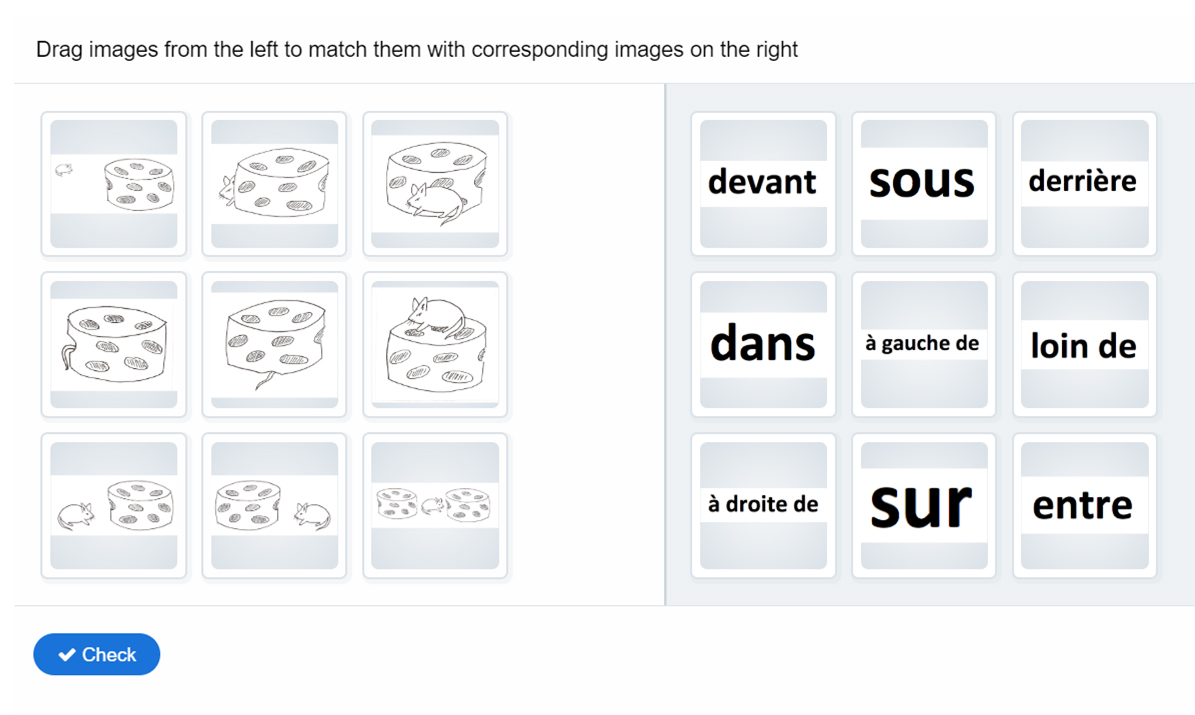FRENCH GRAMMAR GAMES (for Grammar Geeks)
By Sonja Burrows
This month, Professor Brigitte Humbert and I wrap up a months-long collaboration to create and develop an online, digital language-learning grammar game collection for students of French called French Grammar Games. Initially, the games site was intended only to complement a full course site Brigitte has been developing for several years in Canvas; and while our collaboration has succeeded in that regard — serving as a supplemental practice space for Middlebury students enrolled in Brigitte’s advanced French grammar course at the undergraduate College — it has also become so much more: a playful, standalone learning space where students of French both within and beyond Middlebury can drop by anytime and from anywhere, to practice and improve their French by playing the many clever digital grammar games designed by Brigitte.

From the outset of our work together, it became clear to me as a language pedagogy scholar myself that Brigitte is a true master teacher of the French language; while much of her research and teaching have focused on French cinema and film adaptations, she has also developed a deep understanding of meaningful language instruction — evidenced not only by her teaching experience and expertise, but also by the many thorough, clear and comprehensive original materials she has developed for the teaching and practicing of French grammar. As a self-described Romance languages grammar geek, as well as a digital language-learning architect, I knew right away that working with Brigitte would be a fruitful endeavor!
French Grammar Games for Grammar Geeks is a mobile-friendly website built with a full installation of WordPress on the MiddCreate platform. The games you will find on the site are divided into three sections:
 Sentence Whiz, where the user can play games to learn about questions, negations, relative pronouns, active and passive voice, and more structures.
Sentence Whiz, where the user can play games to learn about questions, negations, relative pronouns, active and passive voice, and more structures.
 Word Nerd, where users play games to learn nouns, adjectives, adverbs, pronouns, possessives, prepositions as well as additional parts of speech.
Word Nerd, where users play games to learn nouns, adjectives, adverbs, pronouns, possessives, prepositions as well as additional parts of speech.
 Verb Challenge, where students can master past, present, and future verb tenses as well as tackle conditional, subjunctive, imperatives, and infinitives.
Verb Challenge, where students can master past, present, and future verb tenses as well as tackle conditional, subjunctive, imperatives, and infinitives.
In addition to these three sections, we created a guide for the learning space where users who do not know where to begin or who would like to complete games in an established or recommended path can find support to do so. And finally, we also added a resources area to the site where users can access the many full, original explanations of grammar as well as traditional grammar exercises developed by Brigitte which support the games throughout the site. We then linked relevant sections of the resources area to games which treat the same grammar points, so that users who complete a game and seek more practice or grammar explanations can easily find that needed support.
We also carefully designed a navigation and filtering system on the site so that students can select games which only treat a certain grammar point, if they so choose. Let’s say you are a student of French and you know you need practice specifically with conditional verb tenses. You can easily filter games on Brigitte’s site so that you come up with a set of games all of which treat only conditional verbs, if you wish. We created this filtering system by embedding each game into a post, tagged on the back end to be filterable in the ways described above.
To create the functionality we needed for this game site, we installed a number of plugins on the WordPress dashboard for visual, navigational, and practical purposes: To create many of the grammar games, we used a simple, free plugin called H5P which enables the development of games for a variety of purposes. Additional games were created and embedded using Quizlet, a primarily lexical-set-orientated language-learning tool which enables students to practice with virtual, audio-supported flashcards and games. Brigitte even went so far as to hand-draw some of the illustrations you will find on her games, such as the following game designed to teach prepositions of place (such as in English in front of, behind, next to, etc).

In this game, as the instructions explain the player is invited to drag the images on the left to the correct preposition on the right. When the image and word are paired correctly, they disappear leaving only the unmatched images and words until all have disappeared. If you want to try this game yourself (who wouldn’t?) we invite you to please click here!
Even though we have wrapped up this first phase of the game site’s development, as always when working in the digital, this work is not totally done. There is always room to add more. Brigitte has plans to create more games as her time allows, and I have no doubt the new games will be as varied, clever and lively as those she has already developed.
I leave you with a final note about this collaboration: even though the result of our work is a sophisticated set of learning materials, organized in a meaningful and clear way to support student learning, this was not a complicated project to complete for either Brigitte or myself. Brigitte, like all language professors across our institution, brings considerable expertise and creativity to her teaching and materials development. WordPress and the built-in structure we created together using this tool has enabled Brigitte to easily add her expertise to a learning space in a clear, simple way that we hope will be accessed by many students of French far and wide.